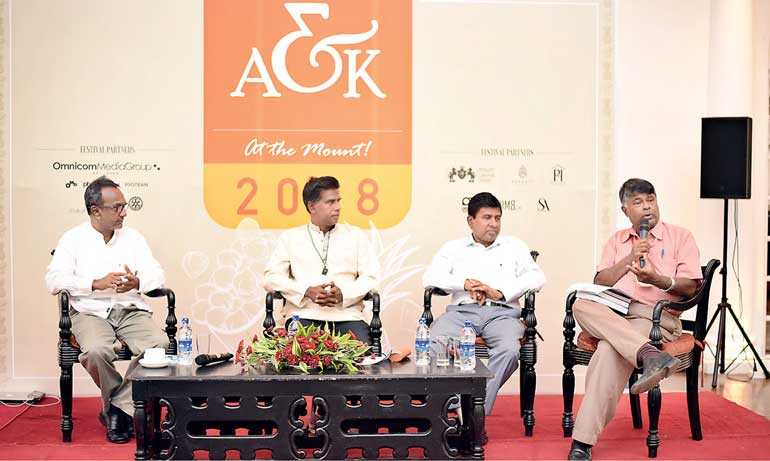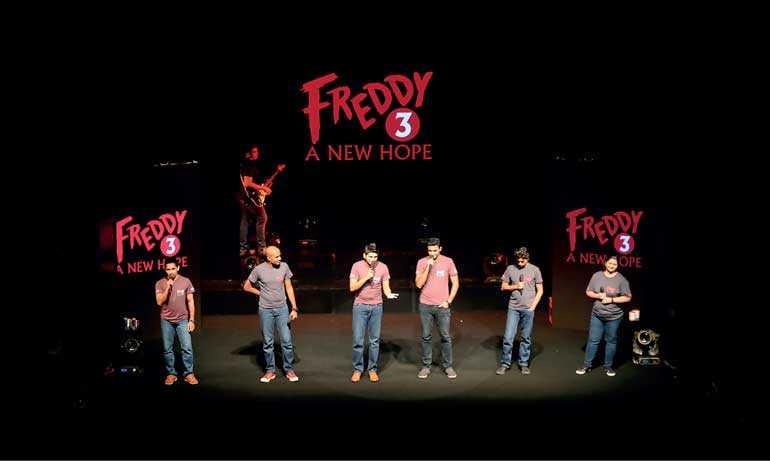Friday Feb 20, 2026
Friday Feb 20, 2026
Friday, 26 October 2018 00:00 - - {{hitsCtrl.values.hits}}


A FUNNY THING HAPPENED ON THE WAY TO THE THEATRE: Sri Lankan playwrights and producers are stepping up to the plate to help civil society develop a social conscience. Lit fests are also increasingly prone to discern the nexus between power, culture and policymaking
Today your columnist will stray a tad bit off the well-trodden path. To make a foray into the realm of three types of the ‘funnies’. Where the sun is always shining on our blessed isle. If there is a cloud on the horizon – why, we’d find that slightly amusing too. In the subdomain of humour as a sweetener, if not in the real world of bitter-pill politics.
Stand-up
 First, I was fortunate enough to have booked a balcony seat on which to park my fundament for Freddy 3: A New Hope. In this, the stand-up franchise’s third outing, maturing impresario Feroze Kamardeen took the mickey out of Colombo’s flops, flubs, failures, fiascos, and petty foibles in his now-customary rib-tickling way. No cow was sacred enough for StageLight&Magic’s dramatic showman & co. to touch with a bargepole – just because one was available. For poking fun at the country’s pressing problems, which no one dares bell much less neuter, is proving to be a possible vehicle for ‘speaking truth to power’ and nudging Sri Lanka in the direction of much-needed sociopolitical transformation.
First, I was fortunate enough to have booked a balcony seat on which to park my fundament for Freddy 3: A New Hope. In this, the stand-up franchise’s third outing, maturing impresario Feroze Kamardeen took the mickey out of Colombo’s flops, flubs, failures, fiascos, and petty foibles in his now-customary rib-tickling way. No cow was sacred enough for StageLight&Magic’s dramatic showman & co. to touch with a bargepole – just because one was available. For poking fun at the country’s pressing problems, which no one dares bell much less neuter, is proving to be a possible vehicle for ‘speaking truth to power’ and nudging Sri Lanka in the direction of much-needed sociopolitical transformation.
While the full inane spectrum of our sick, tired and corrupt society’s idiosyncrasy came in for some stick, it was the lack of a carrot for political transgressors that makes this oeuvre most appetising to aficionados of theatre and politics. Because ludicrous realpolitik and religion taken to ridiculous extremes more recently threaten to undermine Sri Lanka’s new social contract with herself, this irreverent poking of fun at venerable figures (ranging from ex-presidents and media magnates to judges in a certain community’s marriage and divorce courts) was timely and welcome. For this relief, many thanks – well said, Fred!
There was something for everyone with the slightest grievance to a serious axe to grind. Most entertaining was the traditional forgetfulness of leading lights, which took a severe lampooning – “mata mathaka nae, aney”. This was a tonic simply because their selective amnesia is irritating enough in real life and frustrates the course of law and order to say nothing of justice. The tendency of powerful vested interest groups such as the GMOA to hijack the public interest saw their high jinks being presented as a civic form of terrorism. Also the ethnic chauvinism and particularistic exceptionalism that sets the country ablaze time out of mind was critically engaged with creativity and sensitivity.
If stand-up snaps and bites like this, it borders on being satire; and its fits like a glove does Sri Lanka’s need to look at itself in the mirror – and laugh through the tears and grimaces. So Freddy is both cathartic and insidious as a tool for critical engagement with the civil, social and political powers that be. More power to it, as long as its producers and players can continue to prioritise passion for reform over a recipe for profits.
Parody
The effect that a few smiles can make on the polity and their elected representatives alike was also evidently on the minds of the organisers of the Annasi & Kadalagotu Literary Festival this year. Again, there was a broad spectrum of topics, which I will not touch on in this column. However, there were two sessions that stood out for me – at least in terms of tickling the fancy of a politically-savvy readership.
The first of these – a politico-driven seminar on ‘Literature in Governance’ moderated by the amiable Malinda Seneviratne – soon descended from the sublime to the ridiculous. For starters, there was a veritable Babel of tongues with the politician-panellists being invited to speak (and, in turn, respond to audience questions) in any language amenable to them.
To audiences who had turned up ignorantly expecting this lit fest – which is a viable alternative to the distant, expensive, hard-to-get-seats-at Galle Lit Fest – to be interesting, understandable, and rendered in the Queen’s English, it was a double blow. The proceedings were plain only to the speakers of one vernacular, while many disgruntled members of the audience slunk away to other sessions simultaneously occurring at that colonial vestige by the western ocean. Clearly, in literature as in legislature, a savvy curator for the larger project is needed – on top of smart moderators or MPs!
Be that as it may, I was able to salvage something from this session, subtitled ‘The Politics of Writing’, which had undergone a sea-change into something rich – I use the term ironically – and strange: the role of culture in governance. Between the passionate intensity of one former state minister prone to anecdotal recourse in making his case, and the more measured discourse of two others – it was chillingly clear that to the state, culture is a sort of panacea for a plethora of problems. Surely one can have no quibble with the position that books make folks think and prolific policy-makers write. However one cannot forget that fiery personalities write inflammatory literature – Mein Kampf comes to mind – and that even modern democratic states regrettably tend to douse communal fires by pouring petrol or propaganda on troubled waters.
Caricature
If the outworking of literature can be defined as ‘discussion based on understanding’, then one can only despair at the misunderstandings that (the new literacy of an illiterate at worst or semiliterate at best) social media milieu introduces into the mix. Here, as elsewhere in the public domain, the best lack all conviction. And it is into such an arena that contemporary cartoonists ride like some poor lonesome cowboy who’s a long way from home. But like the once-popular Lucky Luke of comic strip yore, they’re often champions of social justice and advocates of all that is egalitarian and equitable. It also helps that they’re easier to understand than recondite columnists such as perhaps yours truly?
So from Gihan De Chickera’s lone stand (Awantha Artigala, double billed with his colleague, was a no show; and more’s the pity: because a dialogue between these two would have been tremendous fun and insightful to boot) I garnered some food for thought – and comfort or consolation. The role of a cartoonist as a journalist, for one: as critic, commentator, and curator of personal as much as national sentiment. Feel like hell? Essay in often graphic form your inner emotions at the demons of external reality in a picture that’s literally word a thousand words. The imperative of critical cartoons to ‘punch up’ rather than down, so that weak or marginalised segments of society are spared oppression by the very Fourth Estate set up to safeguard and defend their rights! And ‘the inherent Sri Lankan ability to see humour in everything’.
Perhaps we didn’t go off at too much of a tangent? After all, while laughter is often prescribed as being the best medicine, I’d rather reflect on sobering realities with no balm for our socio-political woes except the reflections of artists like cartoonists. They claim not be funny people at bottom. And that seems an appropriate place to be these days…
(Journalist | Editor-at-large of LMD | Writer #SpeakingTruthToPower)